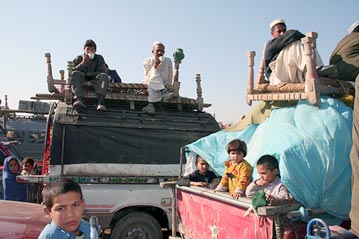More than 18,000 Afghans return home from Pakistan since start of March
More than 18,000 Afghans return home from Pakistan since start of March

KABUL, Afghanistan, March 23 (UNHCR) - More than 18,000 Afghans have returned home since the UN refugee agency started this year's voluntary repatriation to Afghanistan. The pace is expected to increase as a government deadline approaches for unregistered Afghans in Pakistan to be assisted home.
2007 marks the sixth year of UNHCR-facilitated returns to Afghanistan, but this year's arrangements are linked to the recently concluded registration of more than 2.15 million Afghan citizens in Pakistan. The government has said Afghans who did not register during the 15-week exercise, and thus do not have Proof of Registration (PoR) cards, will be considered illegal migrants and subject to prosecution. They have been given a grace period from March 1 to April 15 to repatriate voluntarily with assistance.
A total of 18,609 unregistered Afghans have returned home so far this year, a marked increase compared to the same period in recent years - more than 8,000 Afghans repatriated in March 2006 and over 7,000 in March 2005. Afghans generally prefer to go home in the summer months when the weather is more conducive to rebuilding homes.
The majority of this year's returnees were from Pakistan's North-West Frontier Province. "Life in Pakistan has been very good and we had no problems," said 56-year-old Sultan Ali at UNHCR's voluntary repatriation centre (VRC) in provincial capital Peshawar. "But now I am getting old, for how long can I live as a refugee? I know it will not be easy to start from scratch, but we weave carpets from 6 am to 6 pm here and we will do the same in Kabul."
Ghundi Gul and his family repatriated on the same day. He used to sell fruit in the market in Khyber agency in Pakistan's tribal areas, "but the local authorities do not allow us to work anymore," he said. "I heard that April 15 is the deadline and did not want to face any problems. So I decided to get the [repatriation] assistance that will at least help us to settle in Afghanistan."
Before leaving for Nangarhar province just across the border, he said: "I am going to build my house. My father and three brothers are still in Khyber agency and will join me soon."
Every day, hundreds of trucks and picks-ups loaded with household goods park in front of the VRC in Peshawar to be processed for return. To discourage fraud that could result from the enhanced return package, UNHCR and the authorities have intensified checks and interviews. They have added fingerprint biometrics tests to ensure that only eligible Afghans are processed, and are maintaining the iris-verification test to ensure that no one receives the assistance more than once.
The cash grant, averaging US$100 per person depending on the distance to the area of origin, is given out at encashment centres in Afghanistan. At the centre in Kabul's Pul-i-Charki district, returnee Ezatullah and his family of seven went through mine-awareness training and vaccinations, and seemed pleasantly surprised at the assistance.
"The money certainly helps," said the 42-year-old, who used to sell knick knacks on Peshawar's streets. "I'm not sure what to do with it yet, maybe we'll pool the money and start a small business." Asked why he was returning now, he replied, "I did not try for the PoR card as I wanted to come back in time for the children to start school [in March]."
Said Najib and his family of five also returned from Peshawar. "You've never lived a life in exile, you don't know what it is like," said his ageing mother. "Afghanistan may be hard but at least it is home."
As the snows melt in the mountainous region between Afghanistan and Pakistan, more unregistered Afghans are expected to return home in the three weeks leading up to the deadline of April 15. Unregistered Afghans who return after this date will not receive any assistance. Assisted voluntary return for registered Afghans with PoR cards will start on April 16 through a new process that involves deregistration and invalidating their cards.
Recently, the government of Pakistan contributed US$1 million towards the registration and deregistration process, and pledged an additional US$5 million towards repatriation assistance. In addition, the European Commission's Humanitarian Aid department (ECHO) this week contributed 4.75 million euros (over US$6.3 million) to support voluntary returns from Pakistan and to help returnees, internally displaced Afghans and women at risk in Afghanistan.
Since 2002, UNHCR has helped more than 2.89 million Afghans to return home from Pakistan and over 830,000 Afghans to repatriate from Iran.
By Vivian Tan in Kabul, Afghanistan
and Rabia Ali in Peshawar, Pakistan







